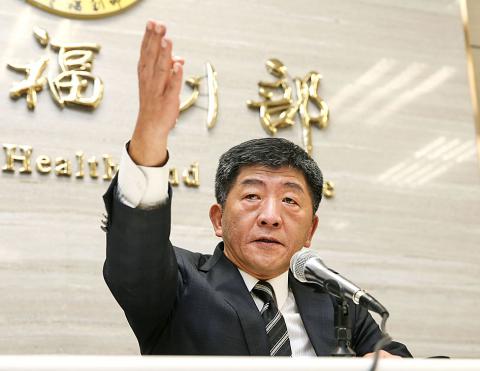The government yesterday denounced Taiwan’s exclusion from this year’s World Health Assembly (WHA), but said it would still send a delegation to Geneva, Switzerland, at the time the 10-day conference is being held.
Taiwan had hoped to once again attend the WHA, to be held in Geneva from May 22 to May 31, as an observer, but it did not receive an invitation from the WHO by the deadline on Monday for online registration because of Chinese obstruction.
The WHA is the WHO’s decisionmaking body.

Photo: CNA
Ministry of Foreign Affairs spokesperson Eleanor Wang (王珮玲) said that Minister of Health and Welfare Chen Shih-chung (陳時中) would lead a delegation to Geneva at the time of the WHA.
If the delegation is not allowed to enter the conference venue, it would still take the opportunity to hold bilateral meetings on the sidelines with delegations of participating nations, Wang said.
Taiwan would have several opportunities to exchange views on global health issues with representatives from other nations during the WHA, she said.
The ministry also said in a statement that if the WHO “succumbs to political pressure” and ultimately decides not to invite Taiwan to the WHA, it would affect the health rights of the 23 million Taiwanese and create a serious gap in the international health system.
At a separate news conference yesterday, Chen said that “the main purpose of attending the WHA is to protect the health and safety of all Taiwanese,” adding that Taiwan also hopes to provide professional, substantial and meaningful contributions to help protect the health and safety of people around the world.
Chen said that if he comes across China’s representative on the sidelines of the WHA, he would stress the importance of Taiwan’s participation in light of global efforts to combat epidemics.
Meanwhile, the Mainland Affairs Council strongly protested China’s obstruction of Taiwan’s participation at the meeting.
In a statement yesterday, the council accused Beijing of using “unilateral political reasons” to exert pressure on the WHO and block it from extending an invitation to Taiwan to attend this year’s WHA.
“The Mainland Affairs Council expresses strong discontent and protests this suppression of our government in violation of the mission of the WHO, as well as the rights and interests of Taiwan’s 23 million people,” the council said.
Beijing has been obstructing the nation’s bids to take part in the International Civil Aviation Organization and the WHO in an attempt to exert pressure on Taipei to achieve its political objectives, it said.
“We will never succumb to Beijing’s pressure, but will continue to make our voice heard in the international community, and fight for our right to participate in the WHA and other international organizations,” the council said.
Saying that the nation’s participation in the WHA was highly anticipated by Taiwanese, the council urged Beijing to carefully consider the consequences of the move and the possible damage it could cause to cross-strait relations.
Additional reporting by Lee I-chia

A Ministry of Foreign Affairs official yesterday said that a delegation that visited China for an APEC meeting did not receive any kind of treatment that downgraded Taiwan’s sovereignty. Department of International Organizations Director-General Jonathan Sun (孫儉元) said that he and a group of ministry officials visited Shenzhen, China, to attend the APEC Informal Senior Officials’ Meeting last month. The trip went “smoothly and safely” for all Taiwanese delegates, as the Chinese side arranged the trip in accordance with long-standing practices, Sun said at the ministry’s weekly briefing. The Taiwanese group did not encounter any political suppression, he said. Sun made the remarks when

The Taiwanese passport ranked 33rd in a global listing of passports by convenience this month, rising three places from last month’s ranking, but matching its position in January last year. The Henley Passport Index, an international ranking of passports by the number of designations its holder can travel to without a visa, showed that the Taiwan passport enables holders to travel to 139 countries and territories without a visa. Singapore’s passport was ranked the most powerful with visa-free access to 192 destinations out of 227, according to the index published on Tuesday by UK-based migration investment consultancy firm Henley and Partners. Japan’s and

BROAD AGREEMENT: The two are nearing a trade deal to reduce Taiwan’s tariff to 15% and a commitment for TSMC to build five more fabs, a ‘New York Times’ report said Taiwan and the US have reached a broad consensus on a trade deal, the Executive Yuan’s Office of Trade Negotiations said yesterday, after a report said that Washington is set to reduce Taiwan’s tariff rate to 15 percent. The New York Times on Monday reported that the two nations are nearing a trade deal to reduce Taiwan’s tariff rate to 15 percent and commit Taiwan Semiconductor Manufacturing Co (TSMC, 台積電) to building at least five more facilities in the US. “The agreement, which has been under negotiation for months, is being legally scrubbed and could be announced this month,” the paper said,

Japan and the Philippines yesterday signed a defense pact that would allow the tax-free provision of ammunition, fuel, food and other necessities when their forces stage joint training to boost deterrence against China’s growing aggression in the region and to bolster their preparation for natural disasters. Japan has faced increasing political, trade and security tensions with China, which was angered by Japanese Prime Minister Sanae Takaichi’s remark that a Chinese attack on Taiwan would be a survival-threatening situation for Japan, triggering a military response. Japan and the Philippines have also had separate territorial conflicts with Beijing in the East and South China